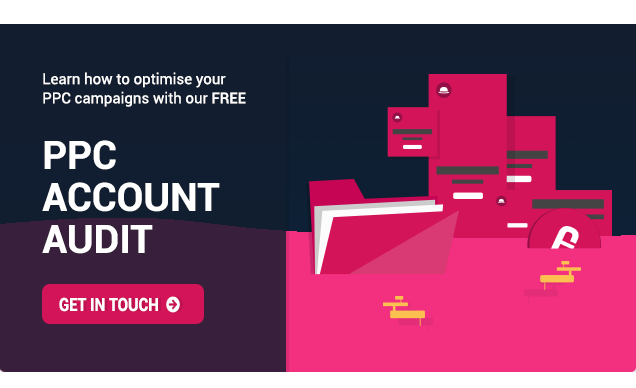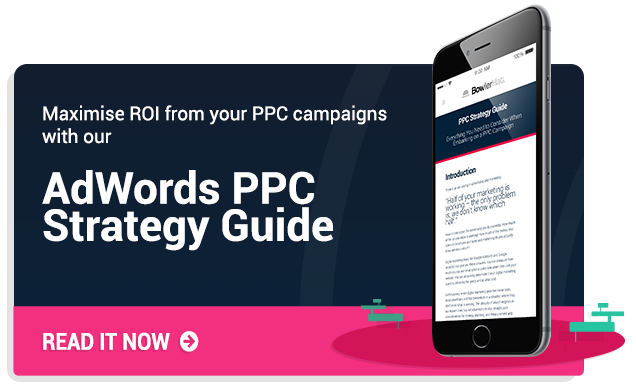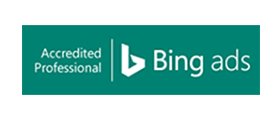What Is PPC?
PPC stands for pay-per-click, and it’s a way of marketing on search engines. As it states in the name, you literally pay-per-click. Essentially, PPC is a targeted way of buying visits to your site that will hopefully end in conversions, whether this is a sale, conversion, or sign-up etc.
It can be a great marketing method if your CPC (cost-per-click) is low, enabling you to still have a good return on investment (ROI). However, it can be extremely competitive in some industries and requires regular maintenance to maintain a good CPC and a steady number of conversions.
PPC often changes too – from AdWords rules to industries becoming more competitive over periods as short as a week – so you have to constantly adapt your PPC strategy.
How Does It Work?
Once an advertiser has set up their ads in a search engine advertising platform (such as Google AdWords or Bing Ads) and has added relevant keywords that they wish their ads to trigger for, they then set bids for how high up in the ad section of the search results their ad will show.
For example, say that in the school cleaning industry the bid for the number one position on the front page of the search results is £3.40, but say you’re bidding at £3.00, you won’t get that top spot. Not to worry though, you’ll be able to see your average position in the metric columns on the advertising platform where your ads are running from.
However, as previously mentioned, PPC can be very competitive. If you’re bidding high enough for that first-place position but your competitor is also bidding for that top spot, what happens then? Well, the advertising platform will then look at other varying factors to determine which ad is best suited for the position.
The most common things that factor into your ad’s position are:
Quality Score – This is a score (out of 10) that sums up the quality of your ad based on ad relevance, landing page experience, and CTR (click-through-rate). If you aim to have a minimum Quality Score of 5/10, you’re well on your way to winning those clicks.
Ad Extensions – Ad Extensions offer relevant information alongside your ad messaging. There are a fair few extensions in AdWords, but the main ones that are often used are sitelink, callout, and structured snippet extensions. Since extensions offer more details about your brand or product, they ensure a positive user experience which is a key factor that Google looks at when determining who gets that top position.
Maintain and adjust these factors regularly and you will optimise your chances of ad clicks and conversions.
What Is Google AdWords?
AdWords is Google’s very own advertising service which allows you to market in the Google search engine and its affiliate sites. AdWords lets you do this via the use of placed text ads that appear when people search for terms that relate to your ad’s offering. For advertisers to get their ads shown in front of potential customers, and for Google to make money from its search engine, advertisers bid on certain keywords they wish to show for.
Google’s Display Network (GDN) is also a way for advertisers to show their display/visual adverts. The GDN is a large network of sites that allows Google to display advertisements on. Generally speaking, Display Network clicks are less expensive than those on the search network.
How Can PPC Benefit You?
Only Pay for Clicks – The great thing about PPC is that you pay for clicks, which is a lot more valuable than paying for impressions. With a click, you’re not necessarily guaranteed a conversion off the back of each ad click, but it still creates brand awareness.
See Faster Results with PPC than SEO – Hungry for results? You should consider PPC if so. Pay-per-click marketing can provide a substantial amount of traffic for a predictable amount of money in less time. However, for continuous results for the foreseeable future, SEO is well worth looking into.
Budget Control – With PPC, you have constant control of your account spending. You determine both your daily and monthly budgets.
Targeted Ads – The great thing about pay-per-click is the in-depth targeting you can set up. It’s not quite as detailed as Facebook ad targeting, but it still does the job to a high standard. Some of the most useful elements to target include device targeting, location targeting, ad scheduling, and keyword targeting. All are super important if you want to get in front of your ideal customers’ eyes at the right time.
Fast Results and Constant Traffic – With the volume of searches carried out across search engines daily comes a great opportunity for results. When running a PPC campaign, you will almost certainly see immediate results.
Better ROI – Because you only pay-per-click, this makes it easier to manage your costs and calculate your estimated ROI. Also, if you’re tracking conversions, PPC makes it easy to track your average cost per conversion.
Getting Started with PPC
Hopefully, this gives you a good basic overview of PPC marketing. If you are looking to get started with PPC and want to learn more about how it can benefit your business, download our free PPC strategy guide to understand how to maximise ROI from your campaigns.
If you have any questions on how to best use pay-per-click ads for your business, get in touch or follow Bowler Hat on Twitter, Facebook, or LinkedIn.








